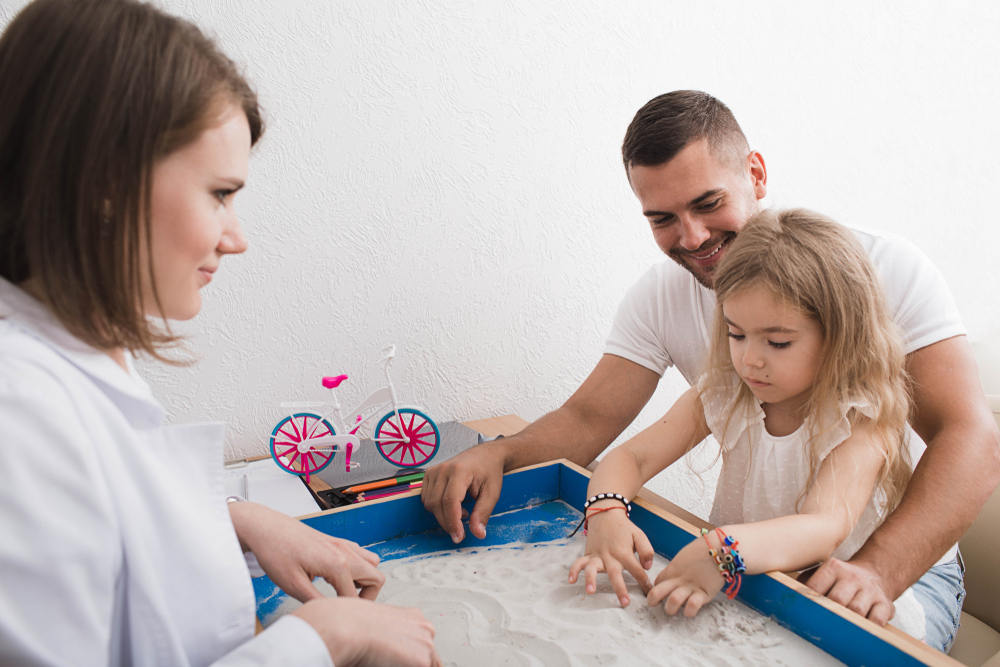Many therapy treatment models for children involve a combination of the identified patient and family. Clinical psychologists and social workers routinely consult, teach, and support the parents of the children/adolescents they are treating.
Caregivers Make a Difference
An important part of a child’s progress is to have parent/s or guardian/s involved in the therapeutic process. Parent consultations are meetings between the counselor and caregivers to discuss the goals and progress of the child. It is helpful for the counselor to hear how the child functions outside of the playroom. These meetings are a great time to share any changes at school, home, or within the community. It is also an appropriate time for the counselor and parent to team up to create parenting strategies or possible solutions for supporting the child.
Generally, we meet with parents every 6-7 sessions. This is always flexible based on need, and the parent and therapist can determine if more frequent parent consults would be helpful.
These meetings are the perfect place to bring up any concerns, discuss progress and goals, and talk about parenting wins and challenges. Your child’s counselor will share any themes arising in therapy, and progress towards goals. Parent consultations are a fantastic way to help the supporters of the child come together and check in on what’s working and better ways to support the child.
Support for the Supporter
Clinical evidence shows that parent consultations decrease problematic behaviors in children and adolescents while simultaneously increasing parental confidence. Further, clinical data suggests that parents self-report an improvement in the relationship with their child.
As a parent, you’re likely thinking that this makes a lot of sense. Who better to help a child with their sleep problems than the parent who is getting up in the middle of the night? Who better to help a child with social anxiety than the caregiver who braces themselves for an anxious meltdown before a birthday party? In the parent consultation treatment model, therapists teach the teachers who spend the most time in the parenting classroom – moms, dads, or caregivers.
Parent consultation is comprised of several different parts and begins with educating parents on the presenting problem or developmental phase of the child.
Other common components of consultations include helping parents to confidently establish household routines, increase positive attention, parental perspective-taking, and increasing overall parental knowledge and confidence in responding effectively to their child or adolescent.
The therapist spends time in sessions reviewing scenarios that relate to the child’s problem and gives parents an opportunity to practice ways to respond. In between sessions, parents are tasked to practice these responses throughout the week. The successes and opportunities for improvement are reviewed with the therapist the following consultation session.
Being Involved in Sessions
At times, consultations involve sharing pieces of your childhood history as this plays a part in how you parent your child. You may also be asked to participate in experiential activities such as art or sandtray.
Another important layer to parent consultation is helping parents understand and address their own anxiety, concerns, or beliefs about their child or adolescent’s behavior. Addressing parents’ own feelings, judgements, and personal coping styles can be an effective way of helping parents manage their own stress and thus model healthy coping at home.
It’s hard to remember discussion points in the moment. That is why we always recommend writing down questions and problems you’d like to discuss. This gives you a starting point for each consultation session. If you come across an issue between sessions, jot it down.
One of the best benefits of consultation sessions is developing communication skills. These skills are tailored to your family specifically. Some families are quiet and reserved. Others are vocal and opinionated. No family dynamic is ‘wrong.’ You simply need to learn the best way to communicate within your family.
Working Together for the Best Outcomes
During your consultation sessions, ask for tips on how to improve conversations at home. Your therapist can suggest tasks, activities and adjustments that work well for you. The more time you have in consultation, the better your therapist will be at tuning into your needs.
Note that your children will feed off your energy and perspective. If you act resistant to consultations or therapy, they will be too. Stay positive and keep an open mind about therapy.
Also, keep in mind, your child has the right to confidentiality. These consultations do not include a play-by-play of what your child says and does during their therapy sessions. It does include broad hypothesis based on play themes and patterns throughout the sessions.
Parent consultation sessions are an opportunity for your child’s therapist to be working with you as a team to improve your child’s emotional and behavioral concerns. After all- you are the expert on your child!

